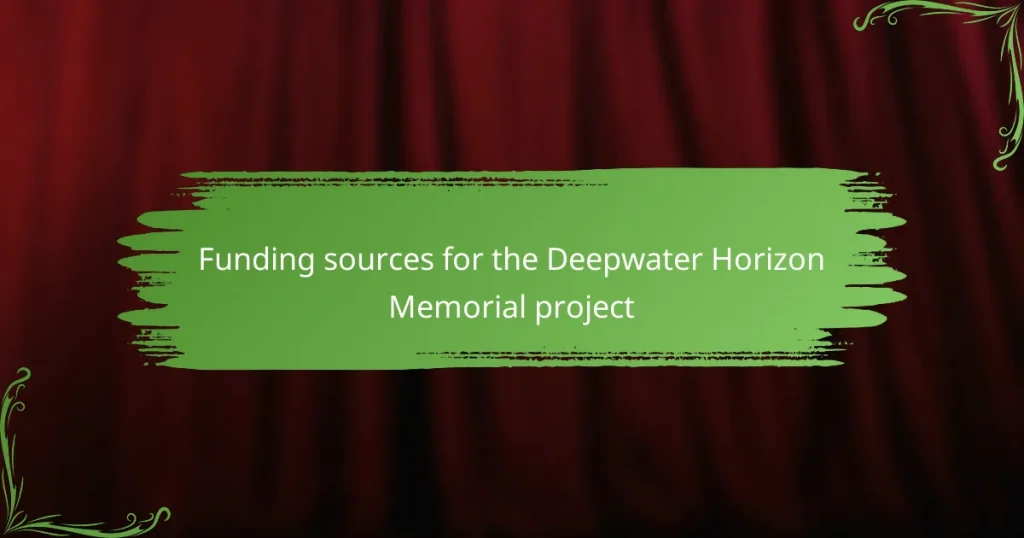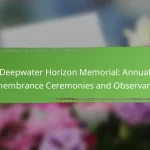The Deepwater Horizon Memorial project is funded through a combination of federal, state, and private contributions. Key funding sources include allocations from the federal government via the National Park Service, financial support from the state of Louisiana, and private donations from individuals and organizations. Community involvement is encouraged through direct donations, fundraising events, and partnerships with local businesses, enhancing the project’s financial stability and fostering broader community support. Diverse funding is essential for the sustainability and success of the memorial, as it mitigates risks, attracts various stakeholders, and enhances the project’s credibility and visibility.
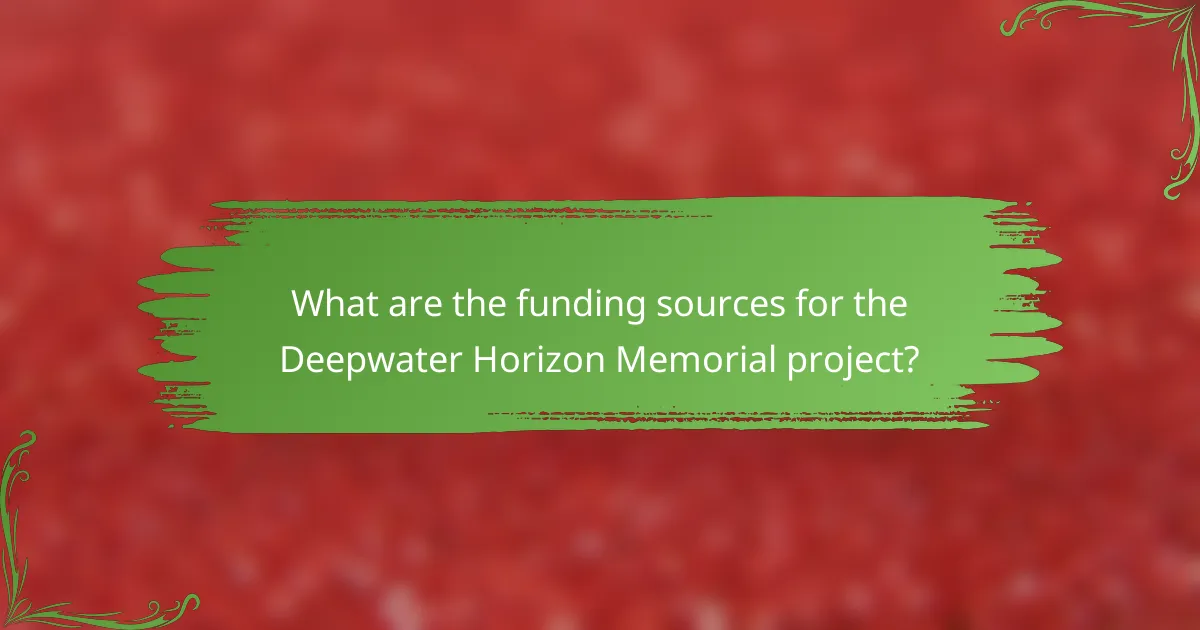
What are the funding sources for the Deepwater Horizon Memorial project?
The funding sources for the Deepwater Horizon Memorial project include federal, state, and private contributions. The federal government allocated funds through the National Park Service. The state of Louisiana also provided financial support for the project. Additionally, private donations from individuals and organizations contributed to the funding. These sources collectively enable the establishment and maintenance of the memorial. The project aims to honor the victims and raise awareness about the environmental impacts of the disaster.
How are funding sources identified for the project?
Funding sources for the project are identified through a systematic approach. This involves researching potential funding organizations, such as government agencies, private foundations, and corporate sponsors. Stakeholder engagement is crucial in this process. Engaging with community members and local organizations can reveal additional funding opportunities. Grant proposals are often developed to align with the goals of funding bodies. Additionally, historical data on similar projects may guide the identification of viable sources. Successful case studies can provide insights into effective funding strategies. Overall, a comprehensive analysis of available resources ensures a diverse funding portfolio for the project.
What criteria determine the eligibility of funding sources?
Eligibility of funding sources for the Deepwater Horizon Memorial project is determined by specific criteria. These criteria typically include alignment with project goals, financial stability, and legal compliance. Funding sources must demonstrate a commitment to environmental and community support. Additionally, they should have a history of funding similar projects. Transparency in funding processes and accountability measures are also essential. Sources must adhere to federal and state regulations related to public funding. Non-profit organizations and government agencies often qualify based on their mission and operational capacity.
How does the project team evaluate potential funding sources?
The project team evaluates potential funding sources through research and analysis. They identify funding opportunities that align with the project’s goals. This includes reviewing grant programs, corporate sponsorships, and crowdfunding options. The team assesses the eligibility criteria for each funding source. They also analyze the funding source’s past contributions to similar projects. The evaluation process involves calculating the likelihood of securing funds. This is based on the source’s funding history and current financial health. The team prioritizes sources that offer sustainable and long-term support. This structured approach ensures that the project secures adequate financial backing.
What types of funding sources are available for the project?
Various funding sources are available for the Deepwater Horizon Memorial project. These include federal grants, state funding, and private donations. Federal grants can be sourced from agencies like the National Park Service. State funding may come from local government allocations or environmental funds. Private donations can be raised through fundraising campaigns or partnerships with nonprofit organizations. Each funding source has specific eligibility criteria and application processes. Federal grants often require detailed project proposals and compliance with regulatory standards. State funding may prioritize projects that benefit local communities. Private donations can be influenced by community engagement and outreach efforts.
What are the primary public funding sources for the memorial?
The primary public funding sources for the Deepwater Horizon Memorial include federal grants and state funding. The federal government allocated funds specifically for environmental restoration and memorial projects. Additionally, state governments may contribute through budget appropriations aimed at public memorials and community recovery efforts. Local municipalities can also provide financial support through public initiatives. These funding sources are crucial for covering construction and maintenance costs associated with the memorial.
How can private donations contribute to the project funding?
Private donations can significantly enhance project funding for the Deepwater Horizon Memorial project. These contributions provide essential financial support that can cover various project expenses. Donations can be directed towards construction costs, maintenance, and educational programs associated with the memorial.
In 2010, the BP oil spill resulted in substantial community impact, highlighting the need for memorialization. Local businesses and individuals often feel a strong connection to such projects and may choose to donate. According to a 2021 survey by the National Philanthropic Trust, 70% of Americans reported donating to causes they care about. This indicates a strong potential for private financial contributions to the memorial.
Additionally, private donations can create opportunities for matching grants from larger organizations. This leverage can amplify the total funding available for the project. Overall, private donations play a crucial role in ensuring the success and sustainability of the Deepwater Horizon Memorial project.
What challenges do funding sources face for the Deepwater Horizon Memorial project?
Funding sources for the Deepwater Horizon Memorial project face several challenges. One significant challenge is securing sufficient financial contributions. Many potential donors are hesitant due to the project’s high costs, estimated at millions of dollars. Additionally, there is competition for funding from other environmental and community projects. This competition can dilute available resources. Another challenge involves navigating regulatory requirements. Funders must comply with various legal and environmental regulations, which can complicate the funding process. Lastly, public perception plays a role. Some stakeholders may question the project’s value, impacting donor willingness. These factors collectively hinder the funding efforts for the memorial.
What are the common obstacles in securing public funding?
Common obstacles in securing public funding include bureaucratic red tape, lack of clear project objectives, and competition for limited resources. Bureaucratic red tape can delay the funding process significantly. Complex application procedures often deter potential applicants. A lack of clear project objectives can lead to misunderstandings about the project’s importance. This confusion may result in insufficient support from decision-makers. Additionally, competition for limited resources is fierce among various projects. Many initiatives vie for the same pool of public funding, making it harder to secure necessary financial backing. Public funding is also often contingent on political priorities, which can shift over time. These factors collectively create significant challenges in obtaining public funding for projects like the Deepwater Horizon Memorial.
How do economic factors influence private donations?
Economic factors significantly influence private donations. Economic conditions affect individuals’ disposable income and financial security. During economic downturns, people tend to reduce charitable giving. Conversely, in prosperous times, donations often increase as individuals feel more financially stable. Research shows that a 1% increase in GDP correlates with a 0.5% increase in charitable donations. Additionally, tax incentives can enhance donation levels by providing financial benefits to donors. Economic stability encourages higher levels of philanthropic engagement. Thus, the interplay of economic health and individual financial capacity shapes private donation patterns.
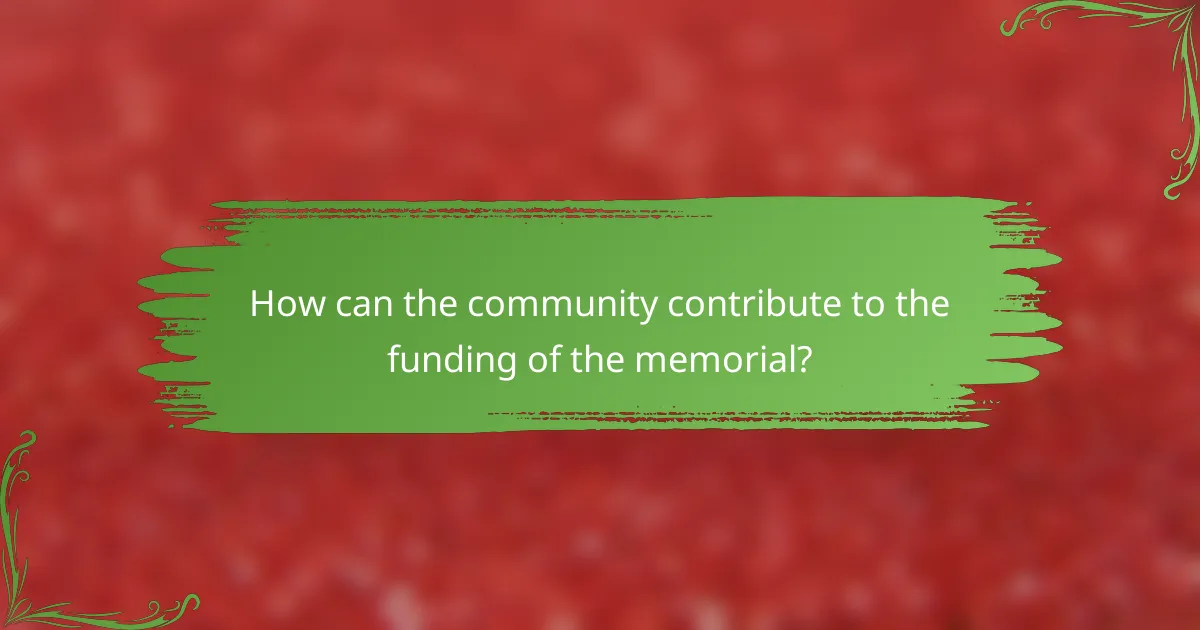
How can the community contribute to the funding of the memorial?
The community can contribute to the funding of the memorial through donations and fundraising events. Local organizations may host events specifically aimed at raising funds. Individuals can also make direct monetary contributions to designated accounts. Crowdfunding platforms can be utilized to reach a wider audience. Community members may volunteer their time to organize fundraising activities. Partnerships with local businesses can help secure sponsorships and donations. Engaging social media campaigns can raise awareness and encourage contributions. These methods have been successfully implemented in similar memorial funding efforts in the past.
What fundraising initiatives are in place for community involvement?
Community involvement for the Deepwater Horizon Memorial project includes various fundraising initiatives. These initiatives aim to engage local residents and organizations in supporting the project financially. Examples of fundraising initiatives are community events, donation drives, and partnerships with local businesses. Community events may include charity runs, bake sales, or art auctions. Donation drives can be organized through online platforms and social media campaigns. Partnerships with local businesses often involve a percentage of sales being donated to the memorial project. These initiatives not only raise funds but also foster a sense of community ownership and awareness about the memorial.
How can local businesses support the funding efforts?
Local businesses can support the funding efforts for the Deepwater Horizon Memorial project by making financial contributions. These contributions can be direct donations or sponsorships for specific project events. In addition, businesses can organize fundraising activities, such as charity events or auctions, to raise awareness and funds. Collaborating with local non-profits can also amplify their impact. By promoting the memorial project through their platforms, businesses can increase community engagement. This involvement not only helps fund the project but also enhances the business’s reputation in the community. Studies show that community-oriented businesses often see increased customer loyalty and support.
What role do volunteers play in fundraising activities?
Volunteers play a critical role in fundraising activities. They help organize events, engage donors, and raise awareness. Volunteers often assist in planning and executing fundraising campaigns. Their involvement can lead to increased participation and donations. According to research, volunteer-led initiatives can raise up to 50% more funds than those without volunteer support. Volunteers also provide valuable networking opportunities. They connect organizations with potential donors and sponsors. Their passion and commitment can inspire others to contribute. Overall, volunteers enhance the effectiveness of fundraising efforts significantly.
What strategies can enhance community engagement in funding?
Engaging the community in funding can be enhanced through targeted outreach and participatory initiatives. Establishing clear communication channels fosters transparency and builds trust. Organizing community forums encourages active participation and feedback. Leveraging social media platforms can amplify outreach and mobilize support. Collaborating with local organizations can extend the reach and credibility of funding efforts. Providing regular updates on project progress keeps the community informed and invested. Creating incentives for donations, such as recognition or involvement opportunities, can further motivate contributions. Research indicates that community involvement in funding initiatives increases overall support and commitment to projects.
How can social media campaigns raise awareness and funds?
Social media campaigns can effectively raise awareness and funds by leveraging their vast reach and engagement capabilities. These platforms allow organizations to share compelling stories and visuals that resonate with audiences. Engaging content can inspire users to support a cause, increasing visibility and participation. For example, campaigns can use hashtags to unify messages and encourage sharing.
Additionally, social media facilitates direct fundraising through features like donation buttons and campaigns. Research indicates that social media fundraising can increase donations by up to 30% compared to traditional methods. This is due to the ease of sharing and the viral potential of compelling content.
Moreover, real-time interaction with supporters can foster a sense of community and urgency. This engagement can lead to higher participation rates in fundraising events and initiatives. Overall, social media serves as a powerful tool for both awareness and financial support.
What events can be organized to promote fundraising efforts?
Charity runs can be organized to promote fundraising efforts. These events encourage participants to collect sponsorships for completing a set distance. They foster community involvement and raise awareness about the cause. Another option is hosting auctions, where donated items are sold to the highest bidder. Auctions can attract local businesses and individuals willing to support the memorial project.
Additionally, benefit concerts can be effective. Local artists perform, and ticket sales contribute to fundraising. This not only raises funds but also builds community spirit. Workshops and classes can also be arranged, where participants pay to learn a new skill. The proceeds from these events directly support the fundraising efforts.
Finally, community fairs can be organized, featuring games, food stalls, and entertainment. These fairs can draw large crowds and provide multiple avenues for donations. Each of these events has proven successful in similar fundraising campaigns, creating a robust platform for raising funds for the Deepwater Horizon Memorial project.
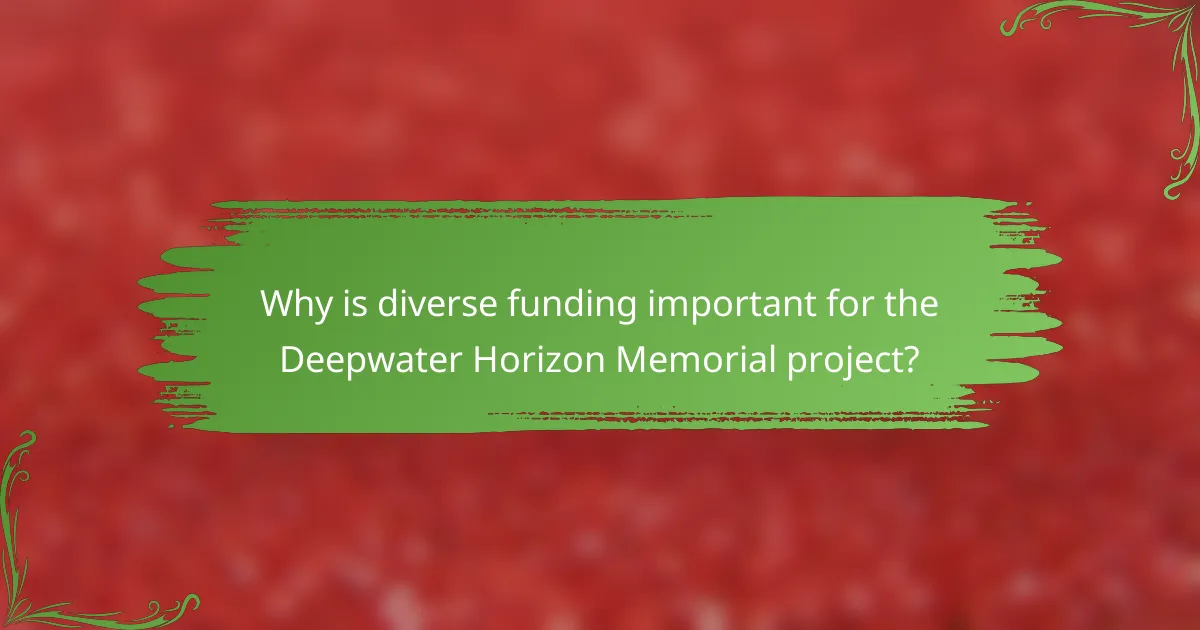
Why is diverse funding important for the Deepwater Horizon Memorial project?
Diverse funding is important for the Deepwater Horizon Memorial project because it ensures financial stability and broad community support. A variety of funding sources can mitigate risks associated with reliance on a single donor. This approach allows for a more resilient financial model. It can also attract different stakeholders, fostering community involvement and ownership of the project. Additionally, diverse funding can enhance the project’s credibility and visibility. For instance, public-private partnerships can leverage resources and expertise from various sectors. This collaborative model often results in a richer, more inclusive memorial that reflects diverse perspectives. Overall, diverse funding is crucial for the project’s sustainability and success.
How does diverse funding impact project sustainability?
Diverse funding enhances project sustainability by providing multiple financial sources. This reduces reliance on a single donor, which can mitigate financial risk. Projects funded by various sources often have greater resilience to economic fluctuations. Additionally, diverse funding can foster broader community engagement and support. Engaging different stakeholders can lead to increased visibility and advocacy for the project. Research indicates that projects with varied funding sources are more likely to achieve long-term success. For example, studies show that organizations with diverse funding are 30% more likely to sustain operations over time. This demonstrates that diverse funding is crucial for the ongoing viability of initiatives like the Deepwater Horizon Memorial project.
What are the benefits of having multiple funding sources?
Having multiple funding sources increases financial stability for projects. It reduces reliance on a single source, minimizing risk. Diverse funding can enhance credibility and attract more supporters. It allows for greater flexibility in project execution. Multiple sources can lead to increased total funding available. This approach can also foster innovation through varied funding ideas. Additionally, it can improve community engagement and support. Finally, it can create opportunities for collaboration among different stakeholders.
How does diversity in funding mitigate financial risks?
Diversity in funding mitigates financial risks by spreading the financial burden across multiple sources. This approach reduces dependency on any single funding entity. If one source fails, others can compensate, ensuring project continuity. For example, a study by the National Endowment for the Arts found that projects with varied funding sources are more resilient to economic fluctuations. Additionally, diverse funding can attract different stakeholders, enhancing community support and engagement. This collective backing can lead to increased stability and credibility for projects like the Deepwater Horizon Memorial. Thus, funding diversity is a strategic safeguard against financial uncertainties.
What best practices should be followed in seeking funding?
Identify potential funding sources relevant to the Deepwater Horizon Memorial project. Research grants, foundations, and government programs that align with the project’s goals. Create a compelling proposal that clearly outlines the project’s objectives and significance. Include detailed budgets and timelines to demonstrate financial planning. Build relationships with potential funders through networking and outreach. Tailor communication to each funder’s interests and priorities. Follow up with funders after submitting proposals to express gratitude and provide updates. Track and report on project progress to maintain transparency and accountability.
How can transparency in funding requests improve donor trust?
Transparency in funding requests can significantly improve donor trust. When organizations clearly outline how funds will be used, donors feel more secure about their contributions. Detailed budgets and spending reports demonstrate accountability. This openness reduces the risk of mismanagement and fraud. Research shows that 78% of donors prefer organizations that provide clear financial information. Trust is further enhanced when organizations share updates on project progress. Regular communication fosters a sense of partnership between donors and organizations. Ultimately, transparency builds long-term relationships that encourage ongoing support.
What are effective communication strategies for engaging potential funders?
Effective communication strategies for engaging potential funders include clear messaging and relationship building. Clear messaging involves articulating the mission and impact of the project. Funders want to understand how their contributions will make a difference. Relationship building is crucial; establishing trust fosters long-term partnerships. Regular updates and transparent reporting on progress keep funders informed and engaged. Tailoring communication to the interests of specific funders enhances connection. Utilizing storytelling can evoke emotional responses, making the project more relatable. Demonstrating past successes with data strengthens credibility. Engaging potential funders through personalized outreach can significantly increase interest and support.
The Deepwater Horizon Memorial project is primarily funded through a combination of federal, state, and private contributions. Key funding sources include federal grants from the National Park Service, state financial support from Louisiana, and private donations from individuals and organizations. The article outlines the systematic approach to identifying funding sources, eligibility criteria, and evaluation processes, while also addressing challenges faced in securing funds. Community engagement and diverse funding strategies are emphasized as critical factors for the project’s sustainability and success.
